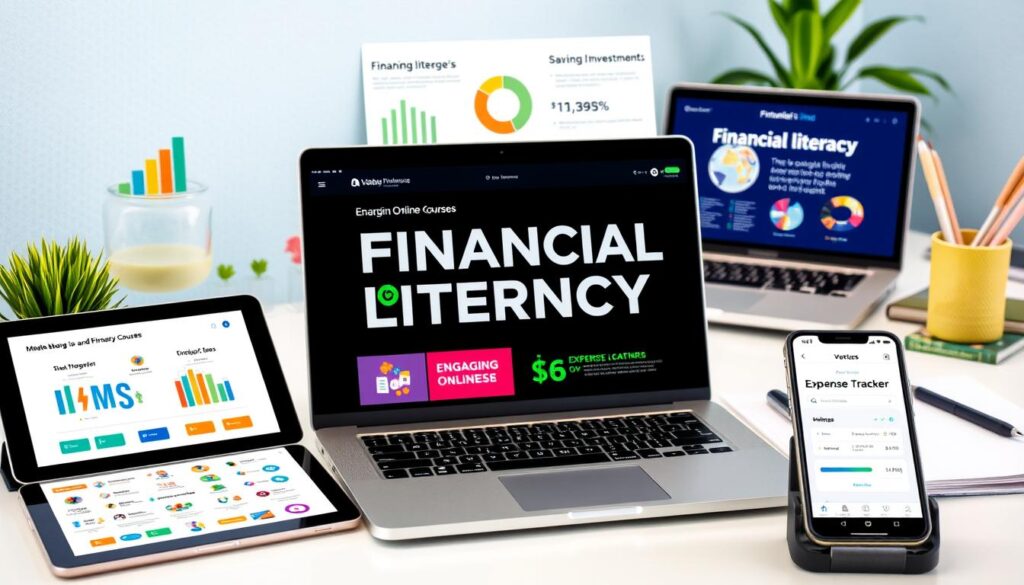Financial technology, or fintech, has changed how we handle our money. It makes managing finances easier than before. Now, we have many tools and services to help us make better money choices.
Apps for budgeting and tracking expenses are just the start. There are also platforms for investing and managing wealth. Fintech is making personal finance more accessible and easy to use. This article will look at how fintech is changing budgeting, investing, and more.
Key Takeaways
- Fintech platforms provide real-time insights into spending patterns and financial accounts, enhancing budget tracking and analysis.
- Automated investment strategies offered by fintech tools cater to individual goals and risk tolerance, improving investment decisions.
- Budgeting apps like Mint, YNAB, and PocketGuard offer features such as automated bill payments and tracking spending patterns, leading to better financial management.
- Robo-advisors, including Betterment and Wealthsimple, lower investment fees compared to traditional advisors, making investing more accessible.
- Fintech platforms incorporate educational resources, quizzes, and interactive tools to enhance financial literacy and awareness.
The Rise of FinTech in Personal Finance
The FinTech revolution has changed how we manage our money. Over the last ten years, new technologies have brought many innovations to finance. Now, people can control their finances better than ever before.
Evolution and Impact of FinTech
FinTech started growing in the mid-2000s, thanks to smartphones and digital apps. By 2022, over half of Americans used FinTech every day. This shows how powerful FinTech has become.
FinTech has made finance more accessible and efficient. Digital wallets are becoming very popular, with 4.4 billion users expected by 2025. It’s also helping the 1.7 billion people without bank accounts get financial services.
Global Adoption and Economic Influence
FinTech is now used by 5.62 billion people worldwide in 2023. It’s not just for developed countries. Africa, Asia, Latin America, and the Middle East are seeing big growth in FinTech.
The economic impact of FinTech is huge. By July 2023, FinTech companies were worth $550 billion. Venture capital funding for FinTech jumped from $19.4 billion in 2015 to $92.3 billion in 2021. Even with a 40% drop in 2022, FinTech is still growing faster than traditional banks.
Budgeting and Expense Tracking Tools

Financial technology, or fintech, has changed how we handle money. Budgeting tools from fintech platforms offer a personal way to manage finances. They help users create budgets that fit their needs and spending habits.
Personalized Budgeting
Apps like Simplifi, Quicken Classic, and YNAB (You Need a Budget) have cool features. They automatically sort transactions and track spending. They also give insights to improve budgeting.
These tools let users set aside money for important categories. This way, they can reach their financial goals.
Expense Tracking
Fintech has also changed how we track expenses. Old methods are now replaced by smart systems. Apps like PocketGuard and Honeydue use algorithms to track spending.
They alert users when they’re near their budget limits. This helps avoid overspending.
These apps connect to bank accounts and credit cards securely. They keep track of all transactions. Subscription trackers also help manage recurring costs.
Today, there are many fintech tools for budgeting and tracking expenses. They offer powerful ways to manage personal finances. These tools help users control their money, make smart choices, and reach their financial goals.
Investment and Wealth Management Platforms

The fintech revolution has changed how we invest and manage wealth. Now, personalized financial planning and retirement management are easier and cheaper. Robo-advisors like Wealthfront and Betterment use data analytics and AI to improve investment strategies.
These platforms create custom portfolios based on your goals and risk level. They use smart tech like tax-loss harvesting and automatic rebalancing to boost returns. This makes professional investment services available to more people, not just the wealthy.
DIY investment apps also let people take charge of their finances. These apps offer features like real-time market data and personalized advice. They help investors make smart choices and manage their wealth on their own.
| Platform | Assets Under Administration (AuA) | Key Features |
|---|---|---|
| FNZ | Over $1.5 trillion | Portfolio tools capable of handling 400,000 trades in 3 minutes, FNZ Academy program for industry innovation |
| Addepar | Over $6 trillion | Serves as one of the largest wealth management platforms globally, integrating portfolio, market, and client data |
| Envestnet | Over $6 trillion | Supports over 109,000 advisors, 17 of the 20 largest US banks, and more than 500 of the largest RIAs |
These fintech platforms and robo-advisors have made wealth management more accessible and affordable. They’ve also brought new ideas to the industry. This is shaping a future of personal finance that’s more inclusive and tech-savvy.
Financial Technology

The world of personal finance has changed a lot thanks to financial technology (FinTech). Robo-advisors and DIY investment apps have made investing easier and more convenient for people.
Robo-Advisors
Robo-advisors have changed the game in investing and wealth management. They make these services cheaper and available to more people. These platforms use data analytics and AI to manage investments based on your goals and how much risk you can take.
Platforms like Wealthfront and Betterment also offer tax-loss harvesting and automatic rebalancing. This helps improve your investment returns. They also provide tools for digital financial planning, helping you see all your finances in one place.
DIY Investment Apps
DIY investment apps have made investing easier for everyone. They have removed barriers like high fees and account minimums. Now, you can start investing with just $1 thanks to apps like Robinhood and SoFi Invest.
These apps offer commission-free trading and let you buy fractional shares. This has created a new group of investors who use technology to invest with small amounts. The apps are easy to use and make learning about finance fun, helping beginners feel more confident.
The growth of FinTech in personal finance has been amazing. The global digital banking platform market is expected to grow by 11.5% each year until 2026. As technology gets better, we can expect these tools to become even more powerful and easy to use. This will help more people take charge of their financial future.
Payment Solutions and Transactions
Mobile wallets have changed how we make payments every day. They use near-field communication (NFC) technology. This makes them key to our financial lives, offering ease, security, and no contact needed.
Mobile Payment Solutions
Services like Google Pay, Apple Pay, and Samsung Pay are very popular. They let users safely keep their card info in a locked format. This makes paying in person and online easy and smooth.
Mobile wallets are growing fast for a few reasons:
- Convenience: They let users pay without cards, just by tapping or scanning their phone.
- Contactless Payments: With mobile wallets, paying without touching is more important now, especially after the pandemic.
- Enhanced Security: They use strong security like biometric checks and tokenization to keep info safe.
As more people use mobile wallets, contactless payments, and digital payments, fintech’s role in finance is growing. It’s shaping how we manage our money.
“The growth trends of cross-border payments and real-time non-card payments are significant indicators for industry changes.”
Fintech is making transactions easier and safer. It’s also leading to new ideas in cross-border and real-time payments. This improves the financial experience for everyone.
Enhancing Financial Literacy

Financial literacy is key in personal finance, and fintech has greatly helped. Budgeting apps offer lessons on saving, investing, and managing debt. They give insights and tips to boost financial knowledge and skills.
Fintech platforms use personal data to give tailored advice. This helps users make better financial choices and reach their goals.
Technology makes learning about finance more fun in schools. Sites like Coursera and Udemy offer financial courses. Your Money Vehicle provides easy-to-understand resources for young people.
Your Money Vehicle teaches students about money management and investing. It also helps them make smart financial choices. Knowing about finance is crucial in today’s world.
- From 2020 to 2021, US adoption of fintech increased by 52%, going from 58% to 88%.
- Fintech companies are bridging the gap for financial inclusion by offering simplified, easily accessible financial transactions through mobile banking platforms, expanding financial services beyond just having a bank account.
- The integration of technology in financial literacy programs in higher education institutions facilitates a more engaging learning environment and enables the collection of valuable data on student engagement and learning outcomes.
“Financial technology has empowered fintech companies and traditional banks to reach underserved markets and improve financial inclusion globally.”
The modern era is seeing big changes in how we use financial services. Fintech makes banking and planning easier and more secure. It also boosts financial literacy for everyone.
Also Read: Ethical Considerations In Artificial Intelligence Development
Conclusion
Financial technology, or fintech, has changed how we manage our money. It offers tools for budgeting, tracking expenses, investing, and making payments online. This makes handling finances easier, more efficient, and user-friendly.
Fintech is set to play a bigger role in managing personal finances in the future. It has already made a big impact on the financial world. This has led to better services, lower costs, and more choices for consumers. Fintech also helps more people join the financial system, making it more inclusive.
But, fintech also brings challenges like security risks, privacy concerns, and regulatory issues. To overcome these, the industry, regulators, and policymakers must work together. They need to ensure fintech grows responsibly and builds trust. Ethical practices and fairness are key as fintech continues to evolve.
FAQs
Q: What are the different types of fintech?
A: The types of fintech include payment apps, lending platforms, personal finance management tools, investment platforms, and blockchain technology solutions. Each type serves a unique purpose in improving financial services and enhancing user experience.
Q: How can I get into fintech careers?
A: To get into fintech careers, you can pursue a degree in finance, technology, or business. Gaining experience through internships at fintech companies or traditional financial institutions can also be beneficial. Additionally, staying updated on fintech innovations and networking within the fintech ecosystem can help you find opportunities.
Q: What role do fintech companies play in financial services?
A: Fintech companies play a crucial role in the financial services industry by offering innovative solutions that improve efficiency, accessibility, and user experience. They disrupt traditional financial services by providing products and services that cater to the needs of modern consumers and businesses.
Q: Can you provide examples of fintech?
A: Examples of fintech include mobile banking apps, peer-to-peer lending platforms, robo-advisors, and cryptocurrency exchanges. These fintech products offer users alternative solutions to traditional financial services, often with lower fees and greater convenience.
Q: How is financial technology changing the financial landscape?
A: Financial technology is changing the financial landscape by democratizing access to financial services, enhancing transparency, and fostering competition among financial institutions. This shift allows consumers to make informed financial decisions and promotes financial freedom.
Q: What are some popular fintech innovations?
A: Popular fintech innovations include open banking, decentralized finance (DeFi), and advanced data analytics for financial decision-making. These innovations help users manage their financial data more effectively and access a broader range of financial products.
Q: How do fintech users benefit from fintech solutions?
A: Fintech users benefit from fintech solutions through increased efficiency, reduced costs, and personalized financial advice. These solutions often provide real-time financial data and insights, helping users make better financial decisions.
Q: What is the fintech growth trend in the financial industry?
A: The fintech growth trend in the financial industry is characterized by rapid adoption of technology in financial services, leading to an increase in investment and the emergence of new fintech startups. This growth is driven by consumer demand for innovative financial products and services.
Q: How do technology companies influence the fintech industry?
A: Technology companies influence the fintech industry by providing the underlying technology infrastructure that enables fintech innovations. Their expertise in areas such as mobile technology and data analytics allows fintech businesses to develop more efficient and user-friendly financial products.
Q: What challenges do fintechs face in the financial services industry?
A: Fintechs face challenges such as regulatory compliance, competition from traditional financial institutions, and the need for cybersecurity measures to protect financial data. Navigating these challenges is crucial for the success and sustainability of fintech companies.
Source Links
- https://www.pcmag.com/picks/the-best-personal-finance-services
- https://www.nerdwallet.com/article/finance/best-budget-apps
- https://dashdevs.com/blog/integrate-your-software-product-with-wealth-management-platform-key-players/
- https://thefinancialtechnologyreport.com/the-top-25-wealthtech-companies-of-2024/


